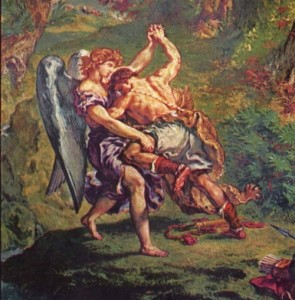Thoughts on Today’s Lessons for Sunday, Aug. 3, 2014
First Reading: Genesis 32:22-31Here’s Jacob again, in a continuing series that we’ve been following for several weeks. Again the trickster takes on a force that proves stronger than he is … and yet, he wins. Or does he? Jacob, who saw God in a dream at Bethel, now meets God’s angel in another dream. He struggles mightily and earns a new name, Israel – “who struggles with God.” Jacob, now Israel, comes of age in the understanding that God is not just out there in the universe but right here with us. God invites us to encounter God in our daily lives, ask hard questions and yes, even struggle with God.
Psalm: Psalm 17: 1-7, 16
Just as God remains faithful to Israel, even when the people struggle, even when they fail; so the Psalmist celebrates God’s faithful, steadfast love, a special love so sure and certain that there’s a specific Hebrew word for it, “chesed,” a word rich with connotations of faith, loyalty, care and grace. The Psalmist reminds us that God loves us and will protect us when we seek refuge.
Second Reading: Romans 9:1-5
Having emphasized in last week’s reading that nothing can separate us all from God’s love through Jesus, Paul now looks back to God’s faithfulness to the descendants of Abraham, Isaac and Jacob-become-Israel. Paul, like all Israel, inherits God’s covenant and commandments “through the flesh” of family heritage. But, in this letter calling on Rome’s Gentile and Jewish Christians to love and accept one another, he reminds us that we, too, become children of God through the Spirit.
Gospel: Matthew 14:13-21
Here is a bible story so beloved that it’s in all four Gospels: The multiplying loaves and fishes. How did Jesus do that? The notion that many dug into their own supplies to supplement the feast rings true to anyone who’s ever indulged in a church potluck. So does the simple symbolism of God’s faithful abundance … and of Jesus taking bread and feeding the community. But look closely at these words: “They need not go away; you give them something to eat.” Can we hear an echo of Jesus saying, “I was hungry and you gave me food … just as you do it to one of the least of these, you do it to me”?

